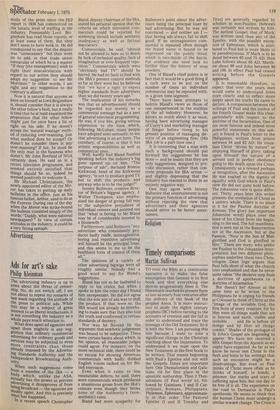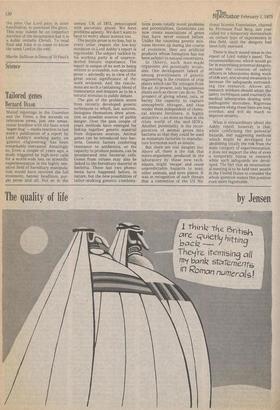Religion
Timely comparisons
Martin Sullivan
TO treat the Bible as a continuous narrative is to make the false assumption that Genesis is its first book and that everything else derives progressively from it. The Hexateuch reached its present form as late as nearly four centuries after the delivery of the book of the prophet Amos. It is more instructive to study the eighth century prophets (BC) before turning to the accounts of creation and the fall in order to understand and trace the message of the Old Testament. So it is with the New. 1 am pursuing this line because I want to note a significant change in the Christian teaching about the Incarnation. To understand it we must open the New Testament at the first book to be written. That means beginning with Paul's Epistles and not with the Gospels. Dates are important here. One Thessalonians and galatans vie for first place in the apostolic authorship. Then 2 Thessalonians (if Paul wrote it), followed by Galatians, I and H Corinthians, Romans, Philippians, Philemon, Ephesians, approximately in that order. The Pastoral Epistles (I and II Timothy and Titus) are generally regarded by scholars as non-Pauline. Hebrews was certainly not written by him. The earliest Gospel, that of Mark, was written later than any of the Epistles, with the possible exception of Ephesians, which is attributed to Paul but is more likely to be pseudonymous. If Mark is to be dated between 65 and 75 AD, then Luke follows about 85 AD, Matthew about 90 and John between 90 and 100. In effect Paul had ceased writing before the Gospels appeared.
It is reasonable therefore, to expect that over the years men would come to understand Jesus more clearly and to reflect more deeply upon the truths He came to declare. A comparison between the writings of Paul and the author of the Fourth Gospel make this clear, particularly with respect to the doctrine of the Incarnation. One of the most famous and indeed most powerful statements on this subject is found in Paul's letter to the Philippians, written from prison between 54 and 62 AD. He visualises Christ "divine by nature" as emptying Himself of glory, taking upon Himself the nature of a servant and in perfect obedience going to His death upon the Cross. Consequently as a reward perhaps or recognition, after the Ascension He was exalted to the dignity of equality with God which in Paul's view He did not quite hold before. The Johannine view is quite different. Thirty years later this writer presents the revelation of Christ as a unitary whole. There is no place in it for the Pauline doctrine of Kenosis. The glory (an important Johannine word) plays over the head of his Christ from the beginning to the end. The full manifestation is seen not at the Resurrection nor at the Ascension, but at the Passion. "Now is the Son of Man glorified and God is glorified in Him." There are many who prefer the Pauline to the Johannine interpretation, but two different philosophies underline these two Christologies. Dean Inge argues that Paul falls short of what the church later emphasised and that he never quite takes "the decisive step from a doctrine of apotheosis to a doctrine of incarnation."
But doesn't he? Almost at the same time as he writes to the Philippians he is urging his friends at Colossae to think of Christ as the "image of the invisible God, the first born of every creature, for by Him were all things made that are in heaven and earth, visible and invisible . . . and He is before all things and by Him all things consist." Shades of the prologue of St John's Gospel are beginning to appear. We have not received a fifth Gospel from the Apostle as we might have expected. As far as we know he never met Christ in the flesh and hints in his writings that such an encounter might be a disadvantage. But even so Paul thinks of Christ more often as he thinks of himself, in bonds, a prisoner, the marks and scars of suffering upon him, but one day to be free of it all. The experience on the road to Damascus is Paul's apotheosis. He seems to think that the human Christ must undergo a similar inward change. The Cross is
the price Our Lord pays in utter humiliation, to purchase His glory. This may indeed be an imperfect doctrine of the Incarnation but it is a noble imitatio Christi. To read Paul and John is to come to know the same Lord in the end.
Martin Sullivan is Dean of St Paul's



































 Previous page
Previous page